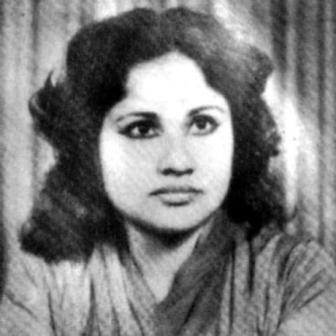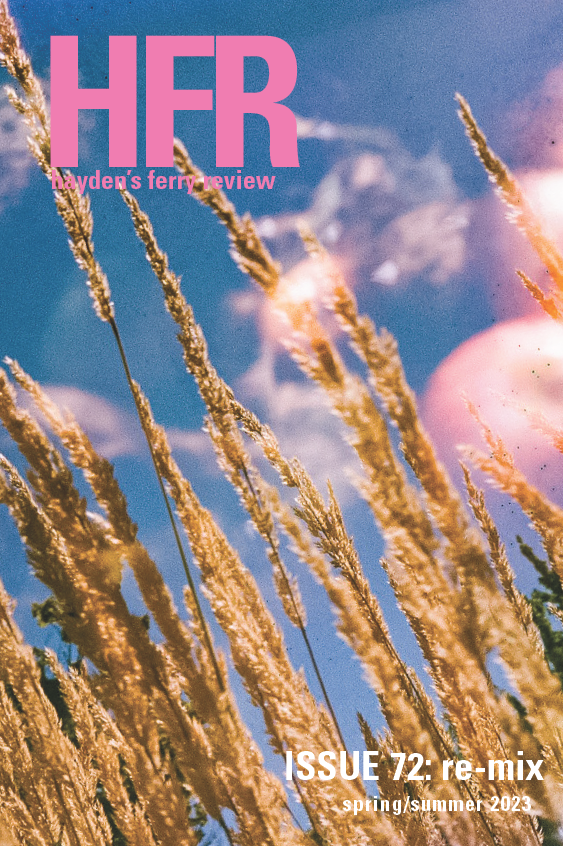This was the second cliffAmongst its lap lay a few of my old thingsI had left this place so abruptlyAnd now I had returned, regretfullyAll the things I had left behindEmbraced meThe shoes that no longer fit,I sold to scrapAnd the coins,I hid them amidst the small clothesThen, I stood in front of the mirrorAnd began to count,the wrinkles of time around my eyesI watched the birds soarSo high, so freeAnd the hunger insideFinally left me
The Second Cliff
Sara Shagufta
Translated from the Urdu by Sabyn Javeri
Feature Date
- June 18, 2024
Series
- Translation
Selected By
Share This Poem
Print This Poem
English Copyright © 2023 by Sabyn Javeri.
All rights reserved.
Reproduced by Poetry Daily with permission.

Sara Shagufta is one of the most talented and the least recognized poets in the history of Urdu literature. Born on 31st October, 1954 in Pakistan, she was taken out of school and married off at an early age, as was the custom within conservative families in those days. Despite not having formal education, she had a mastery over language and her verse showed exquisite craftsmanship. But like other female confessional poets of her generation, such as Plath and Sexton, her struggles with mental illness and her suicide, often overshadow her powerful poetry. Anger and angst is a recurring trope of Sara’s poetry as she writes about gender, sexuality and identity. Sara owns her anger, and that is what makes her verse daunting because she is not afraid to express her vulnerability. As Katherine Peters notes in her unpublished thesis ‘She wrote boldly about her personal life and sexuality, connecting what the French feminist Hélène Cixous calls the ‘female body’ with her feminine voice and bringing her sexual desires into her text.’ She died in Karachi just before her 30th birthday and her poems were published posthumously in two critically acclaimed collections, Aankhein (Eyes) and Neend Ka Rang (The Colour of Sleep). What little we know about her creative process is from the fragments of her journals, and through a biography ‘Ek Thi Sara’ (Once, there was Sara) written by her friend, the renowned Indian writer Amrita Pritam. Read more at: sabynjaveri.com

Sabyn Javeri is the author of Hijabistan (Harper Collins: 2019) and the novel Nobody Killed Her (Harper Collins: 2017) and has edited two multilingual anthologies of student writing titled, The Arzu Anthology of Student Voices (Vol I & II. HUP: 2019, 2018) as well as the recent Ways of Being an anthology of creative non-fiction by Pakistani women writers (Women Unlimited, 2023). Her writing has been published in the South Asian Review, London Magazine, Litro, Bookends Review, Journal of Commonwealth Literature, Wasafiri and Trespass, amongst other publications. Her short story, ‘The Letter’, won the Oxonian Review Short Story Award and her translation of Khalida Hussein’s short Fiction, ‘A Busy Woman’ won the runner up prize for The 2022 – 2023 Jawad Memorial Translation prize. Her research focuses on translations as a form of decolonial feminist resistance and she is currently working on translating the works of Pakistani women writers into English.

72
Tempe, Arizona
Arizona State University
Managing Editor
Tucker Leighty-Phillips
Poetry Editor
Maritza Estrada
Founded in 1986, Hayden’s Ferry Review is a semi-annual, international literary journal edited by the MFA students at Arizona State University. Work from Hayden’s Ferry Review has been included in the Pushcart Prize Anthology, Best American Poetry, and Best New Poets. HFR has notable pieces in Best American Short Stories, Best American Essays, Best American Mystery Stories, and the Pushcart Prize Anthology.
Hayden’s Ferry Review looks for well-crafted work that takes risks, challenges readers, and engages us emotionally and artistically. A small portion of our publication is solicited from established authors, while the majority of our contributors are chosen from the thousands of manuscripts we receive each year.
Poetry Daily Depends on You
With your support, we make reading the best contemporary poetry a treasured daily experience. Consider a contribution today.



